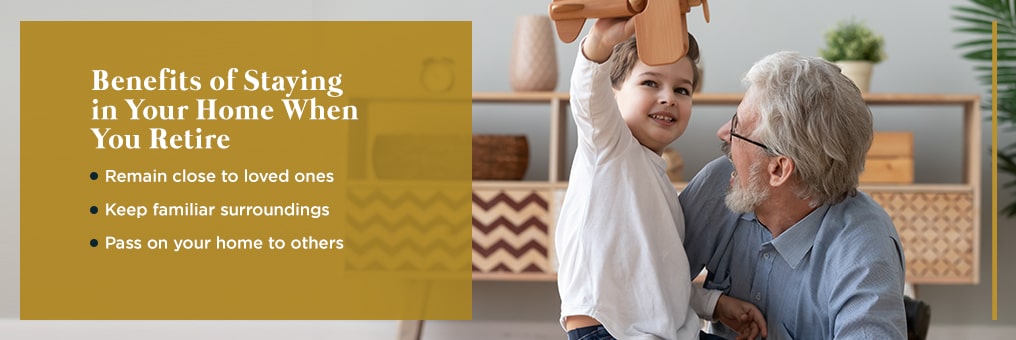Deciding what to do with your home when you retire is no small question — it’s a complicated decision, and there’s no one right answer. Selling may be the best choice for some while staying might be more beneficial for others. In this guide, we’ll help you weigh the pros and cons of selling or staying.
Table of Contents
Pros and Cons of Selling Your Home in Retirement
Deciding to sell your home will give you the chance to move somewhere new and start fresh. Plenty of reasons might motivate you to make a change. One crucial consideration is how selling your home might help you fund your retirement. Moving somewhere new — whether you choose to downsize your home or move into retirement housing or a condo complex — can be expensive. A home sale might make your retirement goals possible. The sale’s proceeds may be tax-free up to half a million dollars for married couples. Selling your home for retirement might help you finance your next move. Here are some additional benefits of choosing to sell.
- Move closer to your children or friends: As you age, beloved people in your life tend to scatter across the map. Moving might allow you to live closer to the people you care about.
- Find a home better suited to your needs: Many older adults find themselves in houses with multiple floors and inaccessible areas. If your mobility has decreased, a ranch-style home or single-floor apartment may better fit your needs. Staying in your current home might require you to add expensive accessibility accommodations.
- Downsize for less maintenance: Empty nesters may find their home is larger than they need. Bigger homes require more upkeep, so downsizing into a smaller residence might be the right choice.
- Explore a new location: You may have lived in the same area for a long time. When you retire, you’ll have the opportunity to live somewhere new and pursue new interests. You might choose a retirement home, where you’ll enjoy the company of others in the same life stage.
- Increase your funds: Selling your home puts more money in your pocket, which you can put toward monthly expenses or travel. You might set some aside for your children’s inheritance.
- Enjoy more flexibility: Once you’ve sold your home, you’ll have much more freedom to live where you please.
However, selling may bring disadvantages to consider. Your home might hold decades of meaningful life memories — leaving all that behind can be challenging. Another potential downside is that you will not be able to bequeath your home to your children or grandchildren if you choose to sell. Whether selling is the best option depends on your unique circumstances.
Pros and Cons of Staying in Your Home
Some older adults prefer to stay in their homes, which is a reasonable and understandable choice. After all, you may have lived in your home for many years, creating a sense of belonging and nostalgia.
Here are some potential reasons to stay in your home when you retire.
- Remain close to loved ones: If your loved ones have stayed close by, you may not feel compelled to move. People who have everything they need in their existing home might be unwilling to leave.
- Keep familiar surroundings: Some older adults find they fare better with familiar surroundings. They may make you feel more comfortable and at home.
- Pass on your home to others: One central motivating factor might be the inheritance you leave behind. You may wish to leave your home to your family’s next generation.
It’s also crucial to consider the possible downsides of staying in your home.
- Feel stuck in one place: Staying in your home may mean less flexibility because owning a home is a serious financial commitment. It might limit your retirement activities, whereas selling would give you the freedom to live somewhere new.
- Pay high monthly expenses: Even if you have paid your mortgage off, monthly homeownership costs can be substantial. The taxes, insurance, utilities and maintenance may limit your funds.
- Lose accessibility: Your current home may not suit your needs. You might find decreased mobility or lost access to specific areas, which can require expensive alterations. Losing access to parts of your home can pose a significant burden.
- Risk injury: Many home floor plans do not accommodate aging adults. For instance, you might struggle with trying to descend a staircase or step into a bathtub. Making the necessary alterations can be expensive and time-consuming. Moving to a retirement community or downsized home can help ensure your safety.

Pros and Cons of Renting in Retirement
Many older adults choose to sell their homes and rent a place to live during their retirement. Doing so brings many advantages, and might be the best choice for you. Here are some significant benefits of renting during your retirement.
- Have flexibility and mobility: Renting allows for more flexibility and mobility than any other option. If you want to travel and explore during your retirement, renting may be an option to consider.
- Do less maintenance work: When you rent, your landlord will take care of maintenance issues. You won’t have to keep up with landscaping or fix a broken sink on your own. For some older adults, this is a necessity. Either way, it will offer you increased free time to pursue hobbies or relax.
- Have fewer expenses: Renting comes with fewer overhead expenses. You can stop paying property taxes, purchase much less expensive insurance and deal with fewer maintenance costs. Senior downsizing or renting might allow you to save money.
- Use amenities: Many rental communities include several amenities in the price of rent. You might have access to a gym, a pool, outdoor grills, a tennis court or other perks.
- Meet other retirees: If you choose to move into a retirement community, you’ll have the opportunity to surround yourself with companions in the same stage of life, which can offer a strong sense of belonging.
Renting also brings some challenges, which are vital to remember. For example, landlords are not always reliable and may not keep up with maintenance tasks. Be sure to read tenant reviews before moving into a rental community. You’ll also have a few costs you did not have as a homeowner, including pet fees or parking fees. The cost of rent can increase from year to year, which may limit your ability to plan your finances.
Pros and Cons of Buying a House in Retirement
If you’d prefer not to rent, you may decide to buy a new home. Like any other option, this has several pros and cons. If you choose to buy a new home during retirement, you may enjoy the following advantages.
- Make alterations as desired: When renting, your landlord will only allow limited alterations. Your lease agreement may give you the leeway to paint a wall, but you likely won’t have permission to undertake an extensive remodeling project. If you buy a home, you’ll only have to comply with homeowner association guidelines and local ordinances. Otherwise, you can make it your own.
- Pay a fixed-rate mortgage: A long-term fixed-rate mortgage offers improved predictability — however, other homeowner costs, including maintenance tasks, are less predictable.
- Live closer to loved ones: You can buy a home closer to those you love, including children and grandchildren. Buying a home gives you the freedom to decide where you’d like to live.
- Choose an accessible home: When shopping for a new home, you can opt for more accessible choices. You might move from your multi-story house to a ranch-style home, or choose a house with existing accessibility features.
Buying a home also has disadvantages. A new home may not fit your evolving needs the way a retirement community could. Depending on where you choose to move, buying a home might incur higher monthly expenses than renting would. If you have heirs to consider, buying a house may leave them in a trickier situation, as you might not outright own the home by the time you pass it on.
Other Considerations
When making a decision like this, be sure to weigh all the possible options and take your time. Account for all the financial, sentimental and lifestyle reasons to stay or move on. Consider whether you or your spouse might need access to professional care in the coming years. Think about your current home’s maintenance demands. Reflect on the ways your neighborhood seems to be changing and whether you welcome those shifts. The decision to stay or go is yours to make, based on your situation’s unique factors.

Sell Your Home With Cates Auction
If you decide to sell your home for retirement, you may want to use an auction service — choose one with experience in selling retirees’ homes while listening to their families’ concerns. With Cates Auction, you’ll set the day and time for your competitive auction. Sales are always non-contingent, meaning no expensive inspections, appraisals or significant alterations. Bidders will compete against each other, potentially leading to one providing an offer that is higher than market value. Auctioning your house when you retire might be the most beneficial and simplified option. Learn more about Cates Auction and request your free property analysis today.

